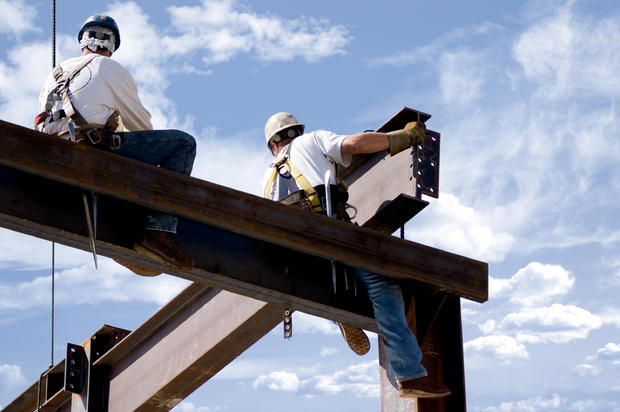America's 10 most dangerous jobs
For some Americans, risking life and limb comes with the job.
Occupations that put workers in harm's way aren't always those obviously risky jobs that are highlighted on reality TV, like History's "Ice Road Truckers." In fact, some of the professions that have the highest rates of injury and death involve providing health or public safety services, according to a new survey from CareerCast.
In 2014, workers suffered almost 3 million nonfatal injuries, while 4,821 lost their lives on the job, according to the U.S. Bureau of Labor Statistics.
Some workers in the most country's most dangerous careers are making annual incomes that barely tip over the poverty line for a family of four, which indicates that bodily risk may not always come with commensurate compensation. The typical annual salary for one of the riskiest jobs is about $45,000.
On the flip side, CareerCast also considered which occupations are the safest. No surprise that many of them involve working at a desk or with computers, such as accountants, computer systems analysts and paralegal assistants. These positions also pay higher wages, with an average annual salary of almost $70,000.
CareerCast based its findings on data from the U.S. Bureau of Labor Statistics, the Center for Disease Control, the Occupational Safety and Health Administration and trade groups.
Read on to learn about the country's 10 most dangerous careers.
Construction laborer: $30,890
Construction laborers, who earn an average annual salary or $30,890, are in a growing field. The BLS projects the number of jobs to grow by 13 percent by 2024.
These workers have a high rate of injuries, however, given the nature of the job. OSHA notes that one in five worker deaths in 2014 took place in the construction field. The top four causes of fatalities were responsible for about six out of 10 construction worker deaths, the agency said. Those "fatal four" are falls, electrocutions, being struck by an object and being caught between objects, equipment or material.
Corrections officer: $40,580
Corrections officers earn an annual average salary of $40,580, and the BLS projects the career will grow by 4 percent through 2024. It's a tough job, given that corrections officers are often stressed and worried about being attacked by an inmate, according to The Marshall Project.
Their rate of injury is 36 times that of the typical American worker, the organization noted.
Emergency medical technician: $31,980
Emergency medical technicians are among the first responders, but they're often in need of care themselves after doing their jobs. The rate of injury for EMTs and paramedics is about three times the national average for all workers, according to a 2013 analysis. Assaults are one issue that EMTs have to contend with, the research found.
EMTs are increasingly needed. The BLS projects the job to grow by 24 percent by 2024, because of accidents, natural disasters and violence.
Farmer: $64,170
Farming might not seem risky to city dwellers, but people who grow up in farming families typically know someone who has been injured on the job. The occupation, which pays about $64,000 annually, is projected to decline by 2 percent through 2024 because of technological innovation that's reducing the need for workers.
The worst farm injuries are usually related to machinery, according to the National Ag Safety Database.
Firefighter: $46,870
Firefighters, who earn an average of $48,870 annually, risk their lives to save people from burning buildings and other dangerous situations. Fewer than half of the 63,000 injuries firefighters suffer each year happen on the "fireground," or the area where firefighting takes place, according to the National Fire Protection Association.
Many of the injuries are sprains or strains, but firefighters are also exposed to hazardous materials such as asbestos or chemicals, according to the group, which notes that sixty-eight firefighters died in 2015. The career is projected to grow by 5 percent through 2024.
Nursing assistant: $25,710
Nursing assistants are the second-lowest paid career on the list, but like all the others the job comes with a high degree of risk. Because nursing assistants are often lifting or moving patients, they're prone to have strains or other injuries.
A 2012 study found that back injuries were the second-most common among nursing assistants, with scratches and open wounds taking the top spot. Other common injuries were black eyes and bruising, strained muscles and human bites.
The career is projected to grow by 17 percent through 2024, mainly because of the aging U.S. population.
Police officer: $60,270
Police officers have one of the highest rates of injury of all U.S. professions, according to the BLS. On average, U.S. police officers suffer from about 57,300 assaults per year, and more than 15,000 of those lead to injuries. From 2004 to 2013, an average of 151 police officers have died on the job each year.
The job is projected to grow by 4 percent through 2024.
Taxi driver: $23,510
Taxi driving, the lowest-paying career on the list, comes with a long list of issues, ranging from stress to injuries and even death. Taxi drivers are 20 times more likely to be murdered while working than other American workers, according to OSHA.
Despite the dangers, the job is projected to grow by 13 percent through 2024, partly as ride-hailing apps like Uber and Lyft lead to increased demand.
Truck driver: $40,260
Truck drivers have higher rates of death and injury than other occupations for one reason: Their job requires them to be on the road, which increases the chance of a crash or accident.
Demand is strong for tractor-trailer truck drivers, but not enough workers are available to fill those roles. With a shortage of about 30,000 qualified drivers, the industry is reaching out to underrepresented groups such as women to join the truck-driving ranks. The job is projected to grow by 5 percent through 2024.
Veterinarian: $88,490
Veterinarian may not seem like a risky job, but it comes with the chance of getting injured by a pet or livestock, noted CareerCast.
"Animals can be unpredictable and sometimes dangerous," Kyle Kensing, online content editor at CareerCast, said in a statement. "Veterinarians working with dogs and cats can face the workplace hazards of bites and scratches, and those who work with livestock and other large animals risk serious injury."
This career, the highest-paid job on the list, is projected to grow by 9 percent through 2024.










